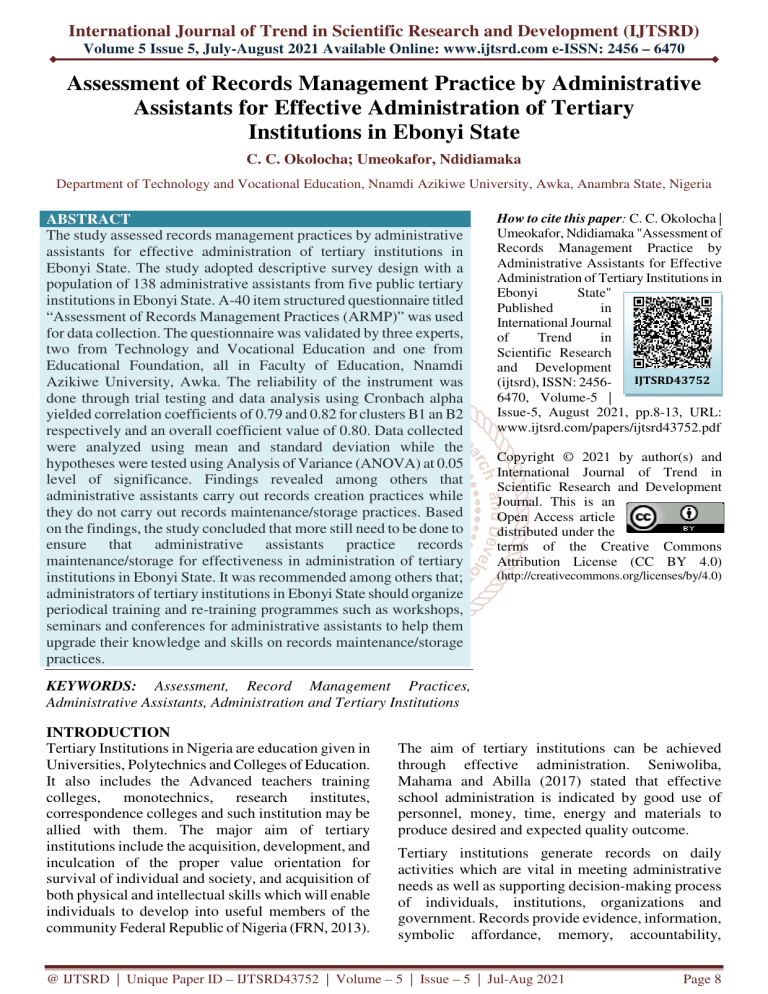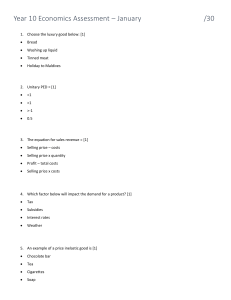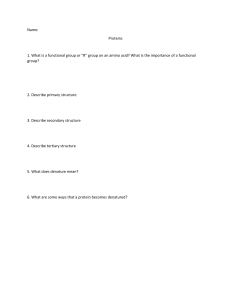
International Journal of Trend in Scientific Research and Development (IJTSRD)
Volume 5 Issue 5, July-August 2021 Available Online: www.ijtsrd.com e-ISSN: 2456 – 6470
Assessment of Records Management Practice by Administrative
Assistants for Effective Administration of Tertiary
Institutions in Ebonyi State
C. C. Okolocha; Umeokafor, Ndidiamaka
Department of Technology and Vocational Education, Nnamdi Azikiwe University, Awka, Anambra State, Nigeria
ABSTRACT
The study assessed records management practices by administrative
assistants for effective administration of tertiary institutions in
Ebonyi State. The study adopted descriptive survey design with a
population of 138 administrative assistants from five public tertiary
institutions in Ebonyi State. A-40 item structured questionnaire titled
“Assessment of Records Management Practices (ARMP)” was used
for data collection. The questionnaire was validated by three experts,
two from Technology and Vocational Education and one from
Educational Foundation, all in Faculty of Education, Nnamdi
Azikiwe University, Awka. The reliability of the instrument was
done through trial testing and data analysis using Cronbach alpha
yielded correlation coefficients of 0.79 and 0.82 for clusters B1 an B2
respectively and an overall coefficient value of 0.80. Data collected
were analyzed using mean and standard deviation while the
hypotheses were tested using Analysis of Variance (ANOVA) at 0.05
level of significance. Findings revealed among others that
administrative assistants carry out records creation practices while
they do not carry out records maintenance/storage practices. Based
on the findings, the study concluded that more still need to be done to
ensure that administrative assistants practice records
maintenance/storage for effectiveness in administration of tertiary
institutions in Ebonyi State. It was recommended among others that;
administrators of tertiary institutions in Ebonyi State should organize
periodical training and re-training programmes such as workshops,
seminars and conferences for administrative assistants to help them
upgrade their knowledge and skills on records maintenance/storage
practices.
How to cite this paper: C. C. Okolocha |
Umeokafor, Ndidiamaka "Assessment of
Records Management Practice by
Administrative Assistants for Effective
Administration of Tertiary Institutions in
Ebonyi
State"
Published
in
International Journal
of
Trend
in
Scientific Research
and Development
IJTSRD43752
(ijtsrd), ISSN: 24566470, Volume-5 |
Issue-5, August 2021, pp.8-13, URL:
www.ijtsrd.com/papers/ijtsrd43752.pdf
Copyright © 2021 by author(s) and
International Journal of Trend in
Scientific Research and Development
Journal. This is an
Open Access article
distributed under the
terms of the Creative Commons
Attribution License (CC BY 4.0)
(http://creativecommons.org/licenses/by/4.0)
KEYWORDS: Assessment, Record Management Practices,
Administrative Assistants, Administration and Tertiary Institutions
INTRODUCTION
Tertiary Institutions in Nigeria are education given in
Universities, Polytechnics and Colleges of Education.
It also includes the Advanced teachers training
colleges, monotechnics, research institutes,
correspondence colleges and such institution may be
allied with them. The major aim of tertiary
institutions include the acquisition, development, and
inculcation of the proper value orientation for
survival of individual and society, and acquisition of
both physical and intellectual skills which will enable
individuals to develop into useful members of the
community Federal Republic of Nigeria (FRN, 2013).
The aim of tertiary institutions can be achieved
through effective administration. Seniwoliba,
Mahama and Abilla (2017) stated that effective
school administration is indicated by good use of
personnel, money, time, energy and materials to
produce desired and expected quality outcome.
Tertiary institutions generate records on daily
activities which are vital in meeting administrative
needs as well as supporting decision-making process
of individuals, institutions, organizations and
government. Records provide evidence, information,
symbolic affordance, memory, accountability,
@ IJTSRD | Unique Paper ID – IJTSRD43752 | Volume – 5 | Issue – 5 | Jul-Aug 2021
Page 8
International Journal of Trend in Scientific Research and Development @ www.ijtsrd.com eISSN: 2456-6470
legitimization of power and a sense of personal and
social identity and continuity (Akuffo and Adams,
2016). Recorded information provides insight for
administrators on issues relevant to institutions and
play immeasurable roles in administration because
administrators employ them on routine basis for
carrying out diverse administrative duties. Alabi
(2017) stressed that without appropriate and adequate
records management, there cannot be effective and
efficient administration of educational institutions.
Records management as conceptualized by the
International Standardization Organization (ISO)
15489 (2016) is a field of management responsible
for the efficient and systematic control of the
creation, receipt, maintenance, use and disposition of
records including processes for capturing and
maintaining evidence of and information about
business activities and transactions in form of records.
The primary function of records management is to
facilitate the free flow of records through an
organization to ensure that information is rapidly
available where and when it is needed. Nmodu (2012)
asserted that effective management of corporate
information allows fast, accurate and reliable access
to records, ensuring timely destruction of redundant
information and the identification and protection of
vital and historically important records. Furthermore,
Nmodu averred that unmanaged records system
makes the performance of duties more difficult, costs
organizations time, money and resources, and makes
them vulnerable to security breaches, prosecution and
embarrassment.
In order to implement and achieve effective records
management, the ISO 15489 (2016) provided a
standard for records management policies and
procedures. The aim is to ensure that appropriate
attention and protection are applied to all records and
that the evidence the information contain can be
retrieved effectively and efficiently using standard
policies and procedures. When policy is established,
good records management practices will be ensured.
Records management practices involve actual
carrying out records management functions or tasks
in accordance with the established record
management standard or procedures (Lawson, 2016).
Records management practices according to Bakare,
Abioye and Issa (2016) is an act of engaging in record
management activities with a view to controlling the
creation and growth of records, reduce operating
costs, improve efficiency and productivity, assimilate
new records management technologies, ensure
regulatory compliance, minimize litigation risk,
safeguard
vital
information,
and
foster
professionalism. Regodon (2017) and Sharma (2011)
outlined records management practices as: records
creation, records maintenance/records storage and
records disposal. Out of outlines records management
practices, this study was limited to records creation
and records maintenance/storage to ensure
comprehensive empirical evidence of records
management practices in tertiary institutions in
Ebonyi State.
Records creation is the process of creating or
receiving records for the conduct of daily business
operations of the organization. ISO (2016) averred
that the creation of records should involve the
creation of content and metadata that document the
circumstance of their creation. Records creation,
whether paper or electronic should also include a set
of rules for referencing, titling, indexing and of
appropriate security marking of records (Duller,
2011).
Records maintenance is utmost importance in records
management so as to ensure control as well as safety
of records. Records are actively used for decisionmaking and in the process there is a lot of handling
and movement of the records involved. Tsabedze
(2012) stated that in order to ensure proper
maintenance of records, all the information regarding
the records storage and retrieval must be gathered and
proper strategies implemented before the records are
created. Record storage is the systematic process of
securing and keeping documents. Adade,
Dampsonquashigah and Eshun (2018) noted that it is
imperative for a manager to store records in media
that ensure their usability, reliability, authenticity and
preservation for as long as users need them.
Good record management practices are paramount to
effective and efficient administration of tertiary
institutions because records are one of the tertiary
institutions’ major assets (Akor & Udensi, 2013).
Effective and efficient administration of any
organization is dependent upon sound records
management practices which ensure that right records
are made available when needed (Njeru, Chege &
Ngeno, 2017). Okoji (2012) stated that even when
information is made available for organization to
function, it has to be professionally managed to
produce meaningful and result oriented impact
desirable for the attainment of organizational goals.
Okoji (2012) stated that administrative assistants are
seen as the custodian of records management in
tertiary institutions as they are professionally trained
and equipped to manage records of any institution.
Administrative assistants are individuals who perform
routine clerical and administrative duties, organize
files, prepare documents, schedule appointments and
support other staff (Occupational Outlook Handbook,
@ IJTSRD | Unique Paper ID – IJTSRD43752 | Volume – 5 | Issue – 5 | Jul-Aug 2021
Page 9
International Journal of Trend in Scientific Research and Development @ www.ijtsrd.com eISSN: 2456-6470
2018). Administrative assistants employed in tertiary
institutions are responsible for creating, maintaining,
storing and disposing records. Incidentally,
administrative assistants in tertiary institutions in
Ebonyi State seem to lack basic knowledge of proper
application of records management practices. Major
and Omenu (2016) pointed out that a look at way
information is generated, used, stored and disposed
off in tertiary institutions revealed lack of expertise
and efficiency in its handling. It is therefore important
for administrative assistants to develop good
strategies in records creation, maintenance, storage as
well as disposal through established records
management procedures and standard for effective
administration of tertiary institutions.
The influencing factors on records management
practices by administrative assistants for effective
administration of tertiary institution could be years of
working. Working experience can be the number of
years one spends as an administrative assistant.
Administrative assistants with above 10 years of
experience may differ in carrying out records
management practices than those below 10 years of
experience. This could be attributed to exposure to
different record management practices as well as long
term experience gained over the years. Gude (2012)
asserted that as people work continuously for a long
time on a particular task, they become more
conversant with the best practices and tenets of the
work and subsequently develop best attitude towards
high performance.
Tertiary institutions are highly decentralized
organization in which many autonomous units carry
out core functions of the institutions. Without
standardized processes, records management
practices would differ between departments, faculties
within a single institution. Good records management
ensure that tertiary institution units employ similar
records management practices. Ifedili and Agbaire
(2011) lamented that despite the fact that educational
records are very vital to the management of
educational institutions, it is disheartening to observe
that many Nigerian tertiary institutions do not take
records-keeping seriously and most of their essential
records are badly stored and secured, as a result, cases
of lost or misplaced documents as well as butchered
or incomplete files become a common occurrence in
these institutions. The authors further stated that this
is a bane of Nigerian higher educational system as not
only does it impair the smooth, effective and efficient
running of the schools but also grossly affects staff
and students who often need such records for
important purpose.
Observations by the researcher revealed that
administrative assistants saddled with the
responsibility of managing records seem not to
possess adequate knowledge of the life cycle of
records and probably lack the inertia for managing
such records in tertiary educational institutions in
Ebonyi State. Situations seem to abound where
required records needed to actualize administrative
process cannot be traced easily or found at all. These
range from students issues through personnel matters
to other administrative concerns which create
considerable challenges to general institutional
effectiveness. It is against this background that this
study was carried out to assess records management
practices by administrative assistants for effective
administration in tertiary institutions in Ebonyi State.
Purpose of the Study
The main purpose of the study was to ascertain
records management practices by administrative
assistants for effective administration of tertiary
institutions in Ebonyi State. Specifically, the study
ascertained:
1. records creation practices by administrative
assistants for effective administration of tertiary
institutions in Ebonyi State.
2. records maintenance/storage practices by
administrative
assistants
for
effective
administration of tertiary institutions in Ebonyi
State.
Research Questions
The study was guided by the following research
questions:
1. What are records creation practices by
administrative assistants for the effective
administration of tertiary institutions in Ebonyi
State?
2. What are records maintenance/storage practices
by administrative assistants for effective
administration of tertiary institutions in Ebonyi
State?
RESEARCH METHOD
The study was conducted in Ebonyi State using
descriptive survey research design. The state has five
public tertiary institutions. The population of the
study comprised 138 administrative assistants in
public tertiary institutions. The entire population was
studies. An instrument titled “Assessment of Records
Management Practices” (ARMP) developed by the
researchers was used for data collection. The
instrument contains items structured on four-point
rating scale of Strongly Agree (SA), Agree (A),
Disagree (D) and Strongly Disagree (SD) which
weighted 4, 3, 2 and 1 respectively. The validation of
ARMP was determined using three experts. The data
@ IJTSRD | Unique Paper ID – IJTSRD43752 | Volume – 5 | Issue – 5 | Jul-Aug 2021
Page 10
International Journal of Trend in Scientific Research and Development @ www.ijtsrd.com eISSN: 2456-6470
used for establishing the internal consistency of the
instrument were single administration n of copies of
ARMP administered to 138 respondents made up of
administrative assistants in public tertiary institutions
in Ebonyi State. Using data obtained, ARMP was
subjected to test for internal consistency using
Cronbach alpha. Coefficient values of 0.79, 0.82, 0.76
and 0.84 were obtained for the four clusters
respectively. The researchers and 3 research assistants
who are administrative assistants in tertiary
institutions in Ebonyi State collected data for the
study. Direct approach was employed in the data
collection in order to ensure that copies of the
questionnaire administered were properly filled and
successfully retrieved. A total of 138 copies of the
questionnaire were distributed, and 131 copies were
successfully retrieved indicated 95% return. The data
collected were analyzed using mean and standard
deviation to answer research question and determine
the homogeneity or otherwise of the respondents’
opinion.
Research Question 1
What are records creation practices by administrative assistants for effective administration of tertiary
institutions in Ebonyi State?
Table 1 Respondents’ mean rating on records creation practices for effective administration of
tertiary institutions.
N = 131
S/N
Records creation practices
X SD
Decision
1 Creation of records using file plan
3.57 0.56 Strongly Agree
2 Receiving document
3.54 0.51 Strongly Agree
3 Systematic referencing of records
2.58 1.13
Agree
4 Systematic titling of records
3.56 0.69 Strongly Agree
5 Dating of documents accurately
3.36 0.48
Agree
6 Regular registrations of outgoing documents 3.30 0.52
Agree
7 Regular registration of incoming document 3.36 0.54
Agree
Regular distribution of records
3.11 0.58
Agree
8
Cluster Mean
3.30
Agree
Data in Table 1 shows that out of 8 records creation practices listed, respondents rated items 1, 2 and 4 strongly
agree with mean scores ranged between 3.54 and 3.57. Items 3, 5, 6, 7 and 8 are rated agree with mean scores
ranged between 2.56 and 3.36. The cluster mean score of 3.30 indicates that on the whole, administrative
assistants agree that they carry out records creation practices for effective administration of tertiary institutions
in Ebonyi State. The analysis shows that responses to item 3 has the highest deviation (1.13) among respondents,
this suggests that the respondents are quite divided in their opinions on systematic referencing of records for
effective administration of tertiary institutions in Ebonyi State. Other items show homogeneity in the
respondents’ responses.
Research Question 2
What are records maintenance/storage practices by administrative assistants for the effective administration of
tertiary institutions in Ebonyi State?
Table 2 Respondents’ mean ratings on records maintenance/storage practices for effective
administration of tertiary institutions.
N = 131
S/N
Records maintenance practices
X
SD Decision
1 Maintaining records based on retention schedule
3.47 0.99
Agree
2 Checking of files periodically to ensure their safety
1.70 0.63 Disagree
3 Tracking movement of records systematically
3.45 0.58
Agree
4 Maintenance of file register
2.97 0.94
Agree
5 Maintenance of file plan
1.79 0.59 Disagree
6 Storage of records on clean environment
1.60 0.64 Disagree
7 Storage of enduring or historical records in archive
2.03 0.56 Disagree
8 Updating knowledge on records maintenance
1.76 0.76 Disagree
9 Periodic audition of records maintenance practices Centrally 2.05 0.89 Disagree
10 Storage of records in a protective material/equipment
3.27 0.94
Agree
11 Identification of active, semi-active and inactive records
2.24 0.90 Disagree
12 Storage of records based on classification system
2.52 0.62
Agree
Cluster Mean
2.40
Disagree
@ IJTSRD | Unique Paper ID – IJTSRD43752 | Volume – 5 | Issue – 5 | Jul-Aug 2021
Page 11
International Journal of Trend in Scientific Research and Development @ www.ijtsrd.com eISSN: 2456-6470
Data in Table 2 indicates that out of 12 records maintenance/storage practices listed, respondents rated items 1,
3, 4, 10 and 12 agree with mean scores ranged between 2.97 and 3.47. Items 2, 5, 6, 7, 8, 9 and 11 are rated
disagree with mean scores ranged between 1.60 and 2.32. The cluster mean score of 2.40 indicates that on the
whole, respondents disagree that records maintenance/storage practices are being carried out by administrative
assistants for effective administration of tertiary institutions in Ebonyi State. The standard deviations for all the
items are within 0.56 to 0.99. This shows that the respondents are not wide apart in their ratings.
Hypothesis 1
There is no significant difference in the mean ratings of administrative assistants on their records creation
practices for effective administration of tertiary institutions in Ebonyi State based on their years of working
experience.
Table 3 ANOVA summary of respondents’ mean ratings on their records creation practices for
effective administration of tertiary institutions based on years of working experience
Source of Variance Sum of Squares Df Mean Square F-ratio P-value Decision
Between Groups
6.861
2
3.431
0.563
.03
Significant
Within Groups
590.699
128 6.090
Total
597.560
130
Data in Table 5 shows that f-ratio of 0.563 at 2 and 128 degrees of freedom with a p-value of 0.03 is less than
the criterion value of 0.05 (.03 < 0.05). This means that there is a significant difference in the mean ratings of
administrative assistants on their records creation practices for effective administration of tertiary institutions in
Ebonyi State based on years of working experience. Therefore, the null hypothesis was rejected.
Hypothesis 2
There is no significant difference in the mean ratings of administrative assistants on their records
maintenance/storage practices for effective administration of tertiary institutions in Ebonyi State based on their
years of working experience.
Table 4 ANOVA summary of respondents’ mean ratings on their records maintenance practices for
effective administration based on years of working experience
Source of Variance Sum of Squares Df Mean Square F-ratio P-value
Decision
Between Groups
30.005
2
15.002
0.821
.44
Not significant
Within Groups
1772.745
128
18.276
Total
1802.750
130
Data in Table 7 show that f-ratio of 0.821 at 2 and 128 degrees of freedom with a p-value of .44 is greater than
the criterion value of 0.05 (.44 > 0.05). This means that there is no significant difference in the mean ratings of
administrative assistants on their records maintenance practices for effective administration of tertiary
institutions in Ebonyi State based on their years of working experience. Therefore, the null hypothesis was
accepted.
Summary of Findings
The findings of the study are summarized as follows:
1. Administrative assistants agree that they carry out
records practices for effective administration in
tertiary institutions in Ebonyi State. Years of
working experience did not significantly
influence respondents’ mean ratings in this
regard.
2. Administrative assistants disagree that they carry
out records maintenance/storage practices for
effective administration in tertiary institutions in
Ebonyi State. Years of working experience did
not significantly influence respondents’ mean
ratings in this regard.
Conclusion
Records management practices are important to
maintain more efficient and credible students,
academic and non-academic records. It is also needed
for effective administration of tertiary institutions.
Therefore, the planning, coordinating, controlling and
implementation of the activities of tertiary institutions
would be a leap in the dark without records that
should made possible through effective records
management practices. Despite the importance of
records management practices in administration of
tertiary institution, the findings of this study revealed
that administrative assistants agree that they carry out
records creation practices while they disagree on
carrying out record maintenance/storage practices. In
@ IJTSRD | Unique Paper ID – IJTSRD43752 | Volume – 5 | Issue – 5 | Jul-Aug 2021
Page 12
International Journal of Trend in Scientific Research and Development @ www.ijtsrd.com eISSN: 2456-6470
view of these findings, the researcher concludes that
more still need to be done to ensure that
administrative
assistants
practice
records
maintenance/storage for effective administration of
tertiary institutions in Ebonyi State.
Recommendation
1. Administrators of tertiary institutions in Ebonyi
State should organize periodical training and retraining programmes such as workshops,
seminars and conferences for administrative
assistants to help them upgrade their knowledge
and skills on records maintenance/ storage. This
will enable administrative assistants to carry out
these records management practices for effective
administration of the institutions.
2. Administrators of tertiary institutions should
ensure there is a laid down standard and policy on
records maintenance/storage and records
practices.
REFERENCES
[1] Akor, P. U. & Udensi, J. (2013). An assessment
of record management system in establishment
division of two universities in Nigeria.
International Letters of Social Humanistic
Sciences, 1(13), 97 – 109.
[2] Akuffo, M. N. & Adams, M. (2016). Records
management practices in ecumenical tertiary
institutions: the Trinity Theological Seminary
in focus. Archives and Manuscripts, 44(2), 6172.
[3] Alabi, A. O. (2017). Records keeping for
effective administration of secondary schools.
Journal of Public Administration and
Governance, 7(2), 66 – 74.
[4] Bakare, A. A., Abioye, A.A. & Isa, A. O.
(2016). Assessment of records management
Practice in selected local government councils
in Ogun State, Nigeria. Journal of Information
Science Theory and Practice, 4(1), 49-64.
[5] Duller, P. (2011). How do you quantify the
added value and business benefits of
information and records management? Paper
presented at the Annual Conference of
Information and Records Management Society,
London.
[6] Federal Republic of Nigeria (FRN, 2013).
National policy on education. Lagos: NERDC
Press.
[7] Gude, A. (2012). Gender, age, level of
education and number of years worked with the
University.
Retrieved
from
http://dx.doi.org/10.1108/eb027111
[8] Ifedili, C. J. & Agbaire, J. J. (2011).
Management of educational records in Nigerian
[9]
[10]
[11]
[12]
[13]
[14]
[15]
[16]
[17]
[18]
universities for better results. Review of
European Studies 3(2) 52 -57.
International Standard Organization ISO 15489
– 1(2016). Information and documentation –
records management Part – 1: Concept and
Principles. ISO
Njeru, F. M., Chege, A. & Ngeno, E. (2017).
An evaluation of records management practices
at the parliamentary service commission of
Kenya (PSC). Saudi Journal of Humanities and
Social Sciences. 2 (7), 515 – 522.
Nmodu, A. N. (2012). Innovation in
information and Records Management towards
business transformation. Paper presented at
Lecture of the National Association of
Professional Secretarial Staff of Nigeria held at
Ife.
Major, N. B. & Omenu, F. (2016). Records
management in higher education institutions in
Bayelsa state: Implications for school
administration. World Scientific
News,
26(2016), 11-20.
Occupational Outlook Handbook (2018).
Secretaries and administrative assistants:
Retrieved from http://www.bls.gov/ooh/officand-administrative-support/ secretaries-andadministrative assistants.htm.
Okoji, B. I. (2012). Information and the new
challenges in records management. Paper
presented at Lecture of the National
Association of Professional Secretarial Staff of
Nigeria held at Ife.
Regodion, C. S. (2017). Records management
practices in the polytechnic, university of
Philipines: Basis for proposed records
management guidelines. Asia Journal
Multidisciplinary
Research
Conference
Proceedings, 1(2), 14 -20.
Seniwoliba, A. J., Mahama, A. V. & Abilla, B.
(2017). Challenges of records management in
higher education in Ghana: the case of
university
for
development
studies.
International Journal of Educational Policy
Research and Review, 4(3), 29 – 41.
Sharma, P. (2011). Management of information
cycle. Journal of Engineering Research and
Studies, 2(4), 15 – 16.
Tsabedze, V. (2012). Public sector records
management in Swaziland records management
practices and public service delivery in
Swaziland. Saarbrucken: Lambert Academic
Publishing.
@ IJTSRD | Unique Paper ID – IJTSRD43752 | Volume – 5 | Issue – 5 | Jul-Aug 2021
Page 13



